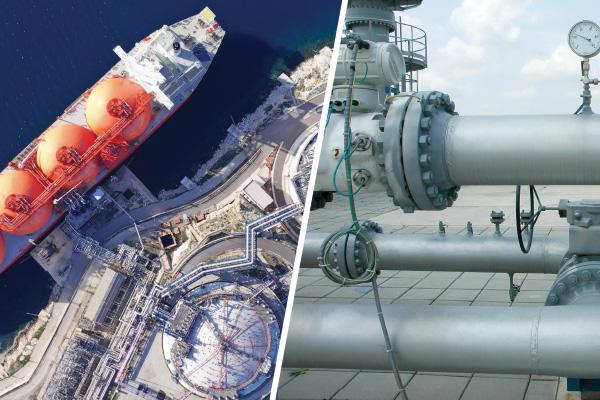
AggregateEU has been the EU’s central effort to diversify its energy imports away from Russian fossil fuels and successfully contributed to our security of supply in 2023. But, what exactly is it? How did it come about? And, what has it achieved?
Recent crisis conditions
In February 2022, the EU energy sector entered unchartered territory, with Russia’s full-scale invasion of Ukraine and attempted weaponisation of Europe’s energy imports, bringing the question of the EU’s security of energy supply into sharp focus. With almost half of EU gas imports sourced from Russia, and large shares of coal and oil - the EU was confronted with a double challenge: to safeguard its security of energy supplies – and keep prices at remotely affordable levels.
Fast-forward 2 years and the landscape of EU energy imports has changed significantly. Although our total gas demand stood at around 400 billion cubic meters (bcm) per year before the war, with only about 10% of it covered by domestic production, the 150 bcm of natural gas (both LNG and pipeline) imported to the EU from Russia in 2021 was nearly halved (to 80 bcm) in 2022 and fell by a similar share (to 43 bcm) in 2023. In short, EU dependence on Russian gas fell from 45% in 2021, to only 15% in 2023.
This has been achieved in no small part thanks to the European Commission’s decisive REPowerEU plan, launched in May 2022, in direct response to Russia’s callous actions. It aims to bolster Europe’s energy security by saving energy, accelerating the clean energy transition, and diversifying the sources of our energy imports.
In the long run, EU energy security will be achieved by replacing imported fossil fuels with domestically produced renewable energy and improving energy efficiency – with the EU aiming to become the world’s first climate neutral continent by 2050. However, while the share of renewables in EU energy consumption is on the rise and more than doubled from 2004 to 2022, natural gas still represents about a quarter of EU energy consumption. And the EU is still heavily reliant on external suppliers for this fuel. This is why the diversification of gas supplies and working with reliable partners have a vital role to play in ensuring security of supply for European citizens, businesses and essential services, such as hospitals, in the short to medium term, until we reach our goal of full decarbonisation.
Diversifying energy supplies
The energy crisis taught the European energy market a hard lesson. The large share of Russian oil and gas imports in Europe’s energy mix had created an over-reliance on a single, untrustworthy supplier.
Ensuring greater diversity in the sources of our energy imports, means that if one source suddenly gets cut off, for whatever reason, the effects are felt less acutely. Trading with more predictable and stable energy partners greatly minimises the risk of malicious disruptions to the energy supply.
A combination of more reliable pipeline and liquefied natural gas (LNG) imports were crucial to overcoming the EU’s dependency on Russian gas imports. As a result, Norway and the US became our main gas suppliers in 2023, representing 30% and 19% of our total gas imports, respectively.
Strengthening Europe’s position on the global energy market
The situation called for a re-thinking of the status-quo on the EU energy market. Despite the unquestionable appetite and need for EU solidarity on this matter, in the early days of the crisis, it was observed that EU players were inadvertently out-bidding each other on the global energy market in an attempt to secure supplies.
In response to the disjointed response to the energy crisis in the EU, the EU Energy Platform was established on 7 April 2022 to help secure the EU's energy supply and to phase out dependence on Russian gas in a coordinated manner through demand aggregation and joint purchasing of natural gas.
AggregateEU was launched in 2023, to contribute to ensuring an adequate energy supply for winter 2023-2024. It provided a channel to aggregate demand for gas by all gas companies established in the EU - or in the Energy Community countries - and attract supplies from international suppliers.
4 tendering rounds were organised from April to December 2023. This involved buyers confirming how much gas they wanted to buy, and, separately, suppliers offering gas to sell. This was followed by a form of match-making through the Platform in order to facilitate agreements. Indeed, during these rounds, after seeking the most competitive offers of international suppliers, AggregateEU matched more than 42 bcm of gas to cover European demand.
Overall, the EU Energy Platform delivered excellent results in aggregating demand and coordinating the purchase of natural gas and has attracted strong interest from market players. And because the energy crisis is not yet over, EU Energy Ministers agreed on 19 December 2023 to prolong the legal framework allowing AggregateEU to operate for another year.
In 2024, AggregateEU is introducing the new concept of a mid-term tender in which buyers will be able to submit their demand for seasonal 6-month periods. These tenders are intended to support industrial consumers and support sellers in identifying buyers who might be interested in a longer trading partnership – that is, up to 5 years – and the first tender will be launched on 15 February 2024.
Related links
Details
- Publication date
- 15 February 2024
- Author
- Directorate-General for Energy



